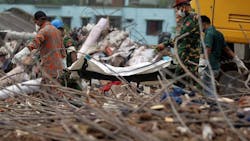Bangladesh Bosses, Labor Hail Retailers' Safety Pledge
DHAKA—Bangladesh labor activists and garment makers, relieved that clients are staying put despite last month's factory disaster, today hailed a promise by top retailers to make the country's factories safer.
The pledge followed last month's collapse of a nine-story factory complex outside Dhaka that killed 1,127 people in one of the world's worst industrial disasters.
Labor activists have campaigned for years for a Western retailer-led drive to improve shocking safety conditions at factories where workers toil for long hours in sweatshop conditions for paltry pay.
The retailers' commitment represents a "huge victory," said Kalpona Akter, head of the Bangladesh Centre for Workers Solidarity.
The agreement, backed by a Europe-based labor coalition called IndustriALL, is "going to benefit each and every garment worker," Akter said.
Top global brands including Benetton, Carrefour and Marks & Spencer joined clothing giants Inditex of Spain and H&M of Sweden on Tuesday in signing on for the deal to improve fire and building safety to avert future tragedies.
Italy's Benetton, along with Spanish company Mango and British retailer Primark, had placed orders with plants in the collapsed Rana Plaza complex which was found to have seriously violated construction laws.
"We welcome this agreement," said Atiqul Islam, president of the Bangladesh Garment Manufacturers and Exporters Association, which represents 4,500 apparel factories. "If they come forward and help repair, retrofit or strengthen our factories, it's good for all of us. It's a reflection of their long-term commitment to Bangladesh."
Bangladesh is the world's second-largest apparel maker. The $20 billion industry accounts for up to 80% of annual exports, but its factories have an appalling safety record.
The agreement, due to be formally signed in coming days, commits retailers to have independent building and fire safety inspections and to pay for repairs.
The full list of signatories has yet to be revealed. But US-based PVH, owner of the Tommy Hilfiger and Calvin Klein brands, and Germany's Tchibo were among the first to support it, according to anti-sweatshop network The Clean Clothes Campaign.
U.S. retail giant Walmart has said it will inspect all 279 of its Bangladesh suppliers for safety but has so far refused to sign on to the safety plan accepted by the European retailers.
Ahsan Mansur, former Middle East division head of the International Monetary Fund, said the agreement is a win-win situation.
"For the retailers, it was impossible to leave Bangladesh because they can't build up another such huge manufacturing capacity elsewhere overnight," Mansur said. "This agreement won't cost them much. They can still make clothing cheaper here while sending a message to consumers they're doing something for the workers."
According to one industry estimate, at least 1,200 factories need to be fixed or relocated at a cost of around $3 billion, Mansur said. But money could easily be raised "by slapping a one percent tax on our garment exports,” he said.
The government has already agreed to an International Labor Organization request to ensure greater plant safety by tightening inspections and regulations.
Labor activist Akter said retailers who fail to sign up to the safety deal "send a wrong message to consumers that they don't really care about the workers who produce their clothing and are dying in the factories."
Industry experts say most garment factories are unsafe as they are housed in converted blocks of flats or complexes designed to accommodate shops and banks, like Rana Plaza. Fires happen frequently due to defective wiring.
Last November a fire in a factory making clothes for more than a dozen Western retailers, including Walmart, killed at least 111 people.
– Shafiq Alam, AFP
Copyright Agence France-Presse, 2013
About the Author
Agence France-Presse
Copyright Agence France-Presse, 2002-2025. AFP text, photos, graphics and logos shall not be reproduced, published, broadcast, rewritten for broadcast or publication or redistributed directly or indirectly in any medium. AFP shall not be held liable for any delays, inaccuracies, errors or omissions in any AFP content, or for any actions taken in consequence.
